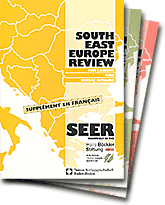Towards the Europeanisation of trade unions in post-Communist Romania
Towards the Europeanisation of trade unions in post-Communist Romania
Author(s): Ninucia-Maria PilatSubject(s): Politics / Political Sciences
Published by: Nomos Verlag
Summary/Abstract: This article aims at encompassing the Romanian context but from a different perspective. In a post-communist setting, which I would characterise as fragile in terms of its socio-economic development, EU requirements have induced a supplementary adaptation pressure concerning compliance with specific requirements in the area of employment and social policy. Thus, this article aims to discuss some developments affecting labour actors in the light of the European integration process. Moreover, the purpose of the article is to explore the responses that trade unions have provided and what they still have to provide in response to the EU pressure for adaptation, as well as how trade unions have been learning to face the challenges of European integration. I consider that, if from a legal and institutional point of view trade unions seem to have incentives for taking part in the transposition of EU demands, de facto the reality is much more complex and the responses diverse. In line with Coen and Dannreuther (2003), in this article, I am interested in analysing in which manner Europeanisation as a ‘guiding principle’ allows for ‘interpretation and incorporation’ by national trade unions. I will refer more precisely to the opportunities created by European integration and the use that trade unions make of the complex mechanisms that impact not only on the national level, but also on the sectoral and local level of interest representation. My research is based on fieldwork realised in Romania as well as on the study of primary sources.
Journal: SEER - South-East Europe Review for Labour and Social Affairs
- Issue Year: 2007
- Issue No: 02
- Page Range: 95-107
- Page Count: 13
- Language: English

